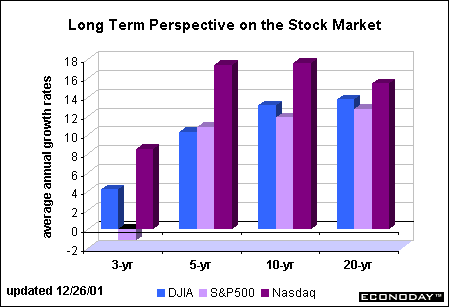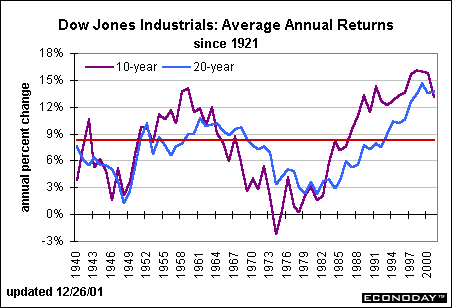Short-takes will not be published next week, January 2, 2002. Look for us again on January 9th. Enjoy a Happy, Healthy, Prosperous and Peaceful New Year.
Investors have three more trading days before they see the final results of this year's stock market returns. Except for the Russell 2000 index of small cap stocks, the market indices are down in 2001 versus a year ago. Through Wednesday, the day after Christmas, the Dow Jones Industrials were showing the smallest decline (-6.5 percent) among the three major indices from year-end 2000 levels. The S&P500 declined about twice as much (-13 percent) while the Nasdaq composite index is almost 21 percent lower than the last trading day of 2000.
Unless the markets post a jubilant rally over the next three days, 2001 will mark the second yearly drop in the major market indices. The Dow last posted back-to-back declines in 1978 and 1979, but the S&P 500 and the Nasdaq composite last recorded two straight yearly declines in 1973 & 1974 that encompassed the 1973-75 recession and a strong bear market.
There is no question that it is painful to see our portfolio returns decline in value from one year to the next. But it is a good idea to keep in mind that stock market investing is risky in the short term. Taking a longer-term perspective is not only useful for our daily evening ritual of a good-night's sleep, but also more appropriate given that the pace of economic activity varies over time.
The chart below compares 3-year, 5-year, 10-year and 20-year returns in the three major indices. A 3-year return reflects the average annual growth over a three-year period; similarly, a 5-year return depicts the average annual return over five years. The S&P500 is showing a negative 3-year return of 1.2 percent per year. However, both the Dow (4.2 percent) and the Nasdaq (8.5 percent) are showing gains over a three-year horizon. The 5-year, 10-year and 20-year returns are pretty healthy for each of the major indices. The DJIA and the S&P 500 have posted declines in 3-year returns on several occasions over the past 50 years. The Nasdaq doesn't have such a long history, but it did post declines for the 3-year return during the 1973-75 bear market. Declines in the 5-year return are less frequent. Only once (1974) was the 10-year return negative for both the Dow Jones Industrials and the S&P 500.

The bottom line
Potential stock market returns need to be high in order to reward investors who are willing to take on the risks of greater volatility relative to other investments. Thus, equity investors will find that returns can be negative just as easily as positive in any given year. However, 10 and 20-year returns are typically pretty healthy (with few exceptions) and equity investors are generally rewarded if they remain invested for the long run.
Given that even 10-year returns can be negative for equity investors, it is important to remain diversified in a variety of investments and even to maintain some cash (liquid Treasury bills) on hand for emergencies or planned expenditures such as housing or college educations. Retirees can also be hurt by long spells of anemic returns unless they maintain a diversified portfolio with some cash holdings.

The chart depicts the 10-year and 20-year average rate of return in the Dow Jones Industrials since 1921. The red line represents the annual average gain in the DJIA since 1921 (8.3 percent). If the long term Dow average of 8.3 percent is to be maintained, we are likely to see some weaker returns over the next few years, although they need not be negative!
Evelina M. Tainer, Chief Economist, Econoday
| 